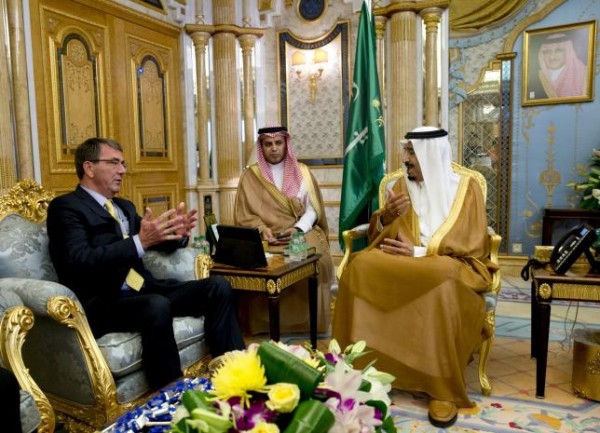
KING SALMAN of Saudi Arabia voiced misgivings yesterday about the Iran nuclear deal to the visiting US defence secretary, as the battle for hearts and minds over this month’s agreement moved from the Middle East to Washington.
Ashton Carter, on a mission to sell the July 14 accord to America’s Middle Eastern allies, said the Saudi monarch had expressed reservations, even while ostensibly welcoming the deal, when they met in the Red Sea port of Jeddah.
It was the second day running Mr Carter had listened to concerns about the agreement thrashed out in Vienna, which lifts a catalogue of crippling sanctions against Iran in exchange for its theocratic rulers accepting strict limits on their nuclear programme.
The Pentagon chief on Tuesday met Benjamin Netanyahu, the Israeli prime minister, who has denounced the deal as a “historic mistake”, and rejected the Obama administration’s offers of military aid as “compensation” in favour of opposing the deal via the US congress.
King Salman, who inherited the Saudi throne in January, expressed doubt about the nuclear deal’s verification process, as well as questioning the “snapback” mechanism for reimposing sanctions if Iran violated its terms, Mr Carter said.
Conflict
“Those are the same issues that we know will arise [during the agreement’s implementation],” said the defence secretary, who also announced that the king had been invited to Washington to meet Mr Obama. Saudi Arabia’s Sunni leadership regards mainly Shia Iran as its principal regional adversary.
The two countries are directly opposed in armed conflicts in Yemen, Iraq, Syria and elsewhere.
Mr Netanyahu has alluded to Saudi concerns in his repeated denunciations of the deal, which he amplified yesterday in a speech to the Knesset, Israel’s parliament, honouring Matteo Renzi, the visiting Italian prime minister.
“In Israel and in many countries in the Middle East, there is broad agreement – this is a bad agreement,” he said.
Israel intensified its lobbying offensive to torpedo the deal in the US Congress when Ron Dermer, the Israeli ambassador to Washington and Mr Netanyahu’s close confidant, met between 30 and 40 Republicans from the House of Representatives. The Israeli envoy emphasised Iran’s supposed untrustworthiness.
The White House launched a counter lobbying exercise.
INDEPENDENT IE

Leave a Reply
You must be logged in to post a comment.